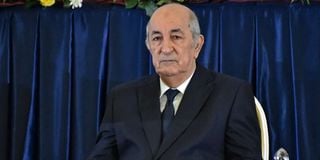Premium
Algeria President back 'within days' after month in German hospital

In this file photo taken on December 19, 2019, Abdelmadjid Tebboune is pictured during his swearing-in as President in the capital Algiers.
Algiers,
Algerian President Abdelmadjid Tebboune is to return home within days after a month of hospitalisation in Germany with coronavirus, his office said Monday.
The announcement appears aimed at ending speculation over a political vacuum fuelled by scant details on Tebboune's condition and his lengthy absence.
"The President of the republic assures the Algerian people about his health, that he is on the way to recovery and will be returning home in the coming days," his office said in a statement.
The presidency said Tebboune had left hospital and was having a "period of convalescence" as recommended by his medical team. It gave no other details.
Tebboune, who is 75 and a heavy smoker, was hospitalised in Germany on October 28 to undergo "in-depth medical examinations", according to the presidency.
He was transferred from a specialised facility in the Algerian capital days after going into self-isolation following reports of novel coronavirus cases among his aides.
A day before he was transferred abroad, the presidency said Tebboune's "state of health does not raise any concern" but a week later it announced he had contracted Covid-19.
While he was still in hospital in Germany, his office also said that the President had finished his treatment and was undergoing "post-protocol medical tests".
Uncertainty
But medical updates have been irregular and his absence triggered uncertainty over the leadership of the oil-rich North African country.
For many Algerians, Tebboune's case has recalled the power vacuum that followed the hospitalisations abroad of former President Abdelaziz Bouteflika who suffered a debilitating stroke in 2013.
The veteran leader, who stepped down in April 2019 weeks into mass protests against his bid for a fifth term in office, stayed in hospital for nearly three months after the stroke.
Monday's statement was the first released by Tebboune's office since mid-November.
But questions remain over details on his recovery and the duration of his convalescence.
Tebboune is expected to enact a new constitution after a referendum held on November 1 in his absence.
The revised constitution is seen as aiming to bury the mass anti-government protests that saw Bouteflika step down, and also to boost Tebboune who was elected on a record low turnout last December.
The constitutional referendum, which passed with two-thirds of the vote, saw participation plunge to new lows, with just 23.7 percent of registered voters casting ballots, official data showed.
Political uncertainty prompted some to question whether Article 102 of Algeria's basic law should be applied to avoid a constitutional crisis.
Under the article, and in case of long-term impairment of the President, the interim senate leader, Salah Goudjil, would act as head of state pending a new presidential election.





